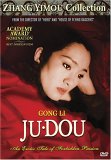| Reviews & Columns |
|
Reviews DVD TV on DVD Blu-ray 4K UHD International DVDs In Theaters Reviews by Studio Video Games Features Collector Series DVDs Easter Egg Database Interviews DVD Talk Radio Feature Articles Columns Anime Talk DVD Savant Horror DVDs The M.O.D. Squad Art House HD Talk Silent DVD
|
DVD Talk Forum |
|
|
| Resources |
|
DVD Price Search Customer Service #'s RCE Info Links |
|
Columns
|
|
|
Ju Dou
Unfortunately, this Razor release is simply an atrocious DVD. It's messed up in just about every way imaginable, the end result resembling a lesser Alpha Video public domain release. (A full rant follows.)
The film is excellent, though this reviewer finds the director's films immediately after this even better. In rural, 1920s China, Ju Dou (Gong Li) has been sold into marriage to a wealthy but abusive old man, Jin-Shan (Wei Li), who operates a highly profitable textile factory. Profitable partly because he has but one employee, 40-year-old adopted nephew Tian-qing (Baotian Li). Jin-Shan's abuse of Ju Dou - he's impotent, taking his frustrations out on his much younger wife to the point of torture - lights a fire under Jin-Shan's belly. Tian-qing begins protecting her, and they have an affair.
When she becomes pregnant with Tian-qing's child, they're content to let Jin-Shan think he's the baby's father. However, events take an unexpected turn: their toddler son (Zhang Yi and Ji-an Zheng) begins bonding with false but doting "father."
Although Yimou Zhang is apparently credited only as Ju Dou co-director (with Fengliang Yang), it bears all the former's signature style and thematic concerns. It's intimate, says much with a minimum of dialogue, vividly captures the hardships of rural, traditional laws and traditions, as well as daily life and artisan craftsmanship. The performances are uniformly excellent and once seen their characters are unforgettable.
But, alas, there's the DVD.
Video & Audio
This reviewer has never seen the Geneon DVD of this title from 1999, but it can't be any worse than this. For starters, a 35mm theatrical print was used for the transfer, which looks like it fell off a truck and unraveled in a gravel pit where wild dogs mistook it for their supper. For much of the film it looks as if all 35 millimeters are scratched, and there are numerous missing frames, tape marks and reel change cues.
The image is soft and there are "video wrinkles," signs of damage to what appears to be an ancient video master. The subtitles are inadequate, with lines like "It's virgin. And for you," and "Cheer and bottom up!" Optional subtitles in both simplified and traditional Chinese are available.
The color is more difficult to assess, but during the film's Miramax release years ago much was made of the fact that China was the last country in the world still printing movies in the old IB Technicolor process (not three-strip photography, as some have reported), and how splendiferous Ju Dou appeared theatrically. Such is not the case here.
Regarding the aspect ratio: Both the IMDb and the print of the movie itself are wrong. Though the end credits claim this was "Filmed in Panavision," it definitely was not a 'scope film. The presentation here is matted to about 1.66:1, but this too appears incorrect. I can offer no definitive proof, but the picture appears to have been shot with full frame 1.37:1 projection in mind. For example, matted as it is here, the film's title card is actually cut off at the bottom, and the Japanese DVD of this Chinese-Japanese co-production is full frame, not 4:3 letterboxed.
The sound is offered in its original Mandarin in AC3-2.0 and 5.1 mixes but they needn't had bothered; both are rife with snaps, crackles and pops galore courtesy the print source. Worse, both have a low-level humming sound running the length of the picture, source unknown.
One final point, a deal-killer for most, concerns the running time. Virtually all sources list a running time of 95 (IMDb), 96 (Ebert), or 98 minutes (Japanese DVD), but the print used here runs just under 89 minutes, and may therefore be cut.
Did I mention the digital break-up and the fact that it jammed in one of my players?
Extra Features
The only supplement is are okay text biographies and filmographies, in both English and Chinese.
Parting Thoughts
Like its protagonist, Ju Dou (the DVD) deserves better. Hopefully a film of this importance will either fall into better hands, or turn up in a superior DVD in another part of the world with English subtitles. Until then definitely skip this one.
Stuart Galbraith IV is a Kyoto-based film historian whose work includes The Emperor and the Wolf - The Lives and Films of Akira Kurosawa and Toshiro Mifune and Taschen's forthcoming Cinema Nippon. Visit Stuart's Cine Blogarama here.
|
| Popular Reviews |
| Sponsored Links |
|
|
| Sponsored Links |
|
|
| Release List | Reviews | Shop | Newsletter | Forum | DVD Giveaways | Blu-Ray | Advertise |
|
Copyright 2024 DVDTalk.com All Rights Reserved. Legal Info, Privacy Policy, Terms of Use,
Manage Preferences,
Your Privacy Choices | |||||||













